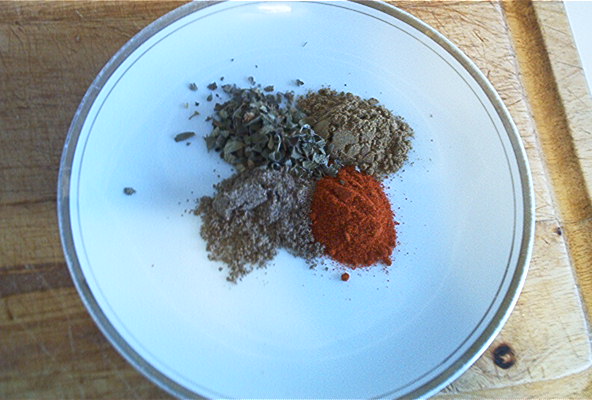Recently, I had lunch out with a friend and in the course of our conversation I mentioned that I was trying a new recipe that week: quinoa-potato croquettes (from Deborah Madison’s Vegetarian Cooking for Everyone). “That sounds good,” my friend said. “Will you have that with some baked chicken or something?” No, I explained, it was one of our meatless meals. “But it’s not Monday,” my friend pointed out.
I explained that Meatless Mondays don’t usually work for us – Monday is slow cooker day, due to work and school schedules. However, we try to have at least two or three meatless meals a week; just not on set days.
“Well,” she said, “I know that Paul McCartney wants me to save a cow once a week, but my family just won’t go along with that.” Now, frankly, I had forgotten that Paul and Linda were the original driving force behind Meatless Mondays, so that part of the reply threw me for a few minutes while I tried to both figure out the connection and why her words bothered me. By then my friend was on to other topics of conversation. But her comment stuck with me, and I have been thinking about what it was that troubled me about it.
Now I can break my thoughts down into three parts to analyze some arguments to eat less meat and what troubled me about the above conversation.
The first problem is the why: the attachment of a celebrity to the idea that those of us who choose to remain omnivores can still choose to forego meat from time to time. Other people would also like us to make this choice, Mark Bittman, for instance. Or my mother. But as with anything else, doing something because someone else, especially someone famous, wants us to is not the best reason.
As much as I might admire the cow, doing it to “save a cow” is not a good reason, either. Nor is “saving” a chicken, a lamb, a salmon, or a pig, even though for many vegetarians this is indeed part of their philosophy. Why not set our sights higher and do it to save the world? A decrease in meat consumption will, eventually, translate to a decrease in the demands we place on the earth to provide feed for those animals we will consume.
The second reason I plan meatless meals is to save money. Meat, especially the organic meat I prefer to feed my family, can be expensive. There are a few levels here depending on how you purchase meat. First, most meals we prepare with meat are also designed to provide leftovers for lunches and on-the-fly dinners; the meat gets stretched to cover as many meals as possible, making the cost more approachable. Poaching a whole chicken (say, the antibiotic-free Amish ones our butcher carries) with vegetables and herbs provides not only meat for two different dinner dishes and three or four lunches, but also broth for soups, risotto, etc.
It can get expensive when you purchase just a package of two boneless, skinless breasts (say, the ones available frozen at our co-op.) This might make one dinner dish and lunch for two the next day – for the same price as the whole chicken – and is more likely to lead to a week with more meatless meals, if going on cost alone.
Finally, the third part of the problem: that my friend’s family won’t put up with meatless meals. While I do ask my family what they want to eat each week, if they have any particular cravings or interests, I am usually the one making up the menu and shopping list each week, because I am the one doing most of the cooking. When my husband cooks, he generally chooses the meal. One day when my daughter begins cooking, she will get to set the menu. The real question is, what will happen if they don't accept the menu. I have a feeling that the above friend has not really tested the theory.
So for our menu planning, Thursday nights are generally the time I ask for suggestions, we talk about what is going on in the coming week (many evening events = many simple meals), and I make up the menu. One night a week my husband teaches a class from 5-8pm; those nights Cora and I often have breakfast for dinner (scrambled eggs or pancakes and fruit) or pasta and carrot sticks. A couple days a week I am home during the day and can prepare a more time-intensive meal, like mutter paneer or chicken pot pie. Days we are gone all day and come home hungry at dinnertime demand the slow cooker meal or a pot of leftover soup. Despite the flexibility required, there are ample opportunities to be creative and create tasty meals without meat.
And now, writing about this, there is a fourth aspect that I object to in the very term “meatless meal” – it sounds like with meat not a factor, there is a gaping hole in your plate. That something is being taken away from your meal that should have been there. As if someone plated you a lovely serving of meatloaf, baked potato, and steamed broccoli and then, just before they set the plate in from of you, took that slice of meatloaf and threw it in the garbage. When we eat meatless, and I’m sure this is true for some of you, too, there is not an empty space on the plate where the meat should have been. It isn’t about what is missing, but about what is present. It’s about different flavors, different combinations, different textures.
At lunch the other day, I wasn’t able to put together a satisfying reply to my friend, but now I could, and it would go something like this:
As a family we choose to eat a few meatless dinners each week because it is healthier for everyone, its good for the Earth, it allows us to eat better meat when we do consume it, and it celebrates flavor diversity. It seems to me, that we even appreciate meat more when we eat less. Go figure!
Deborah Madison’s Quinoa-Potato Croquettes, from Vegetarian Cooking for Everyone
(We ate these, as Madison suggests, with sour cream and salsa. Accompanied by a salad, this made for a tasty dinner.)
- 1 large russet potato, cooked and mashed

- 1 cup cooked quinoa
- 1 small onion, finely diced
- 2 tablespoons sunflower seed oil, plus oil for cooking (I used canola)
- 2 teaspoons paprika
- 1 teaspoon ground coriander
- 1 teaspoon ground cumin
- 1/2 teaspoon dried oregano
- 2 garlic cloves, minced
- 1/4 cup chopped parsley or cilantro
- 1 egg
- 1/3 cup grated Jack cheese (Madison suggests cottage cheese or mashed tofu as alternatives. I didn’t really measure the cheese very carefully.)
- 1 cup fresh or dried breadcrumbs
Combine mashed potato with the cooked quinoa in a bowl.
In a pan, sauté the onion in 2 tablespoons oil in a small skillet over medium heat for 2 minutes, then add the spices and oregano. Cook over medium heat, stirring frequently, until the onion is soft, about 8 minutes; then add the garlic and cook for 1 minute more. Add this to the potato-quinoa mixture along with the parsley, egg, cheese, and salt to taste.
Work the mixture together, then divide it into four large or eight smaller portions and shape them into ovals. Press each croquette gently into the bread crumbs. Generously film a nonstick skillet with the oil and set over medium heat. When hot, add the croquettes and cook on both sides until nicely browned.

Merie Kirby grew up in California, moved to Minneapolis for grad school, and after getting her MFA stayed for fifteen more years. She now lives in Grand Forks, ND with her husband and daughter. Merie writes poetry and essays, as well as texts in collaboration with composers. She also writes about cooking, reading, parenting, and creating on her own blog, All Cheese Dinner. Her most recurrent dream is of making cookies with her mother. This is an excellent dream. Her last artilce for SGT was: Cooking up a resolution.




